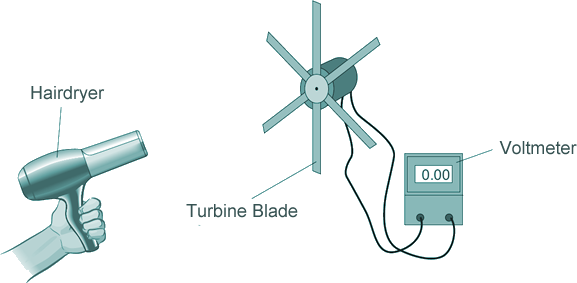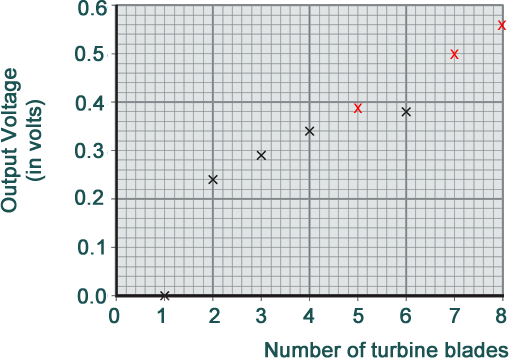GCSE Standard Questions: The Generator
Q5. A student investigated how the output voltage of a model wind turbine was affected by the number of turbine blades.
The equipment he used is shown in the diagram below.

(a) Suggest two factors, other than the number of turbine blades, that will affect the output voltage of the model wind turbine.
 Wind strength - the speed of the airflow from the hairdryer - power setting on the hairdrier. The distance between the hairdrier and the turbine will also affect this.
Wind strength - the speed of the airflow from the hairdryer - power setting on the hairdrier. The distance between the hairdrier and the turbine will also affect this.
 The area of turbine being hit by the airflow - length / area / size / shape/ angle of incidence of the turbine blades
The area of turbine being hit by the airflow - length / area / size / shape/ angle of incidence of the turbine blades
[2 marks]
(b) Some of the student's results are shown in the graph below.



(i) Plot the remaining results on the graph using the data in this table.
Number of turbine blades |
Output voltage in volts |
5 |
0.39 |
7 |
0.50 |
8 |
0.56 |
All three correct gives two marks - any one point incorrectly plotted lose one mark - two mistakes you get no marks.
[2 marks]
(ii) The output voltage for 6 turbine blades is lower than expected. The low value was caused by a measurement error. State the name of this type of measurement error.
Random error 
[1 mark]
(iii) What two conclusions can be made from the student's results as the number of blades is increased from 1 to 4?
There is zero output voltage (or speed) with 1 blade  but, as the number of blades increases, output voltage (or speed of rotation) increases.
but, as the number of blades increases, output voltage (or speed of rotation) increases. 
[2 marks]
(c) Commercial wind turbines can be manufactured with a number of blades between 2 and 8. Suggest two factors that manufacturers would need to consider when designing and constructing commercial wind turbines.
Any two from:
- output voltage / power (required)

- mass / weight / material / area / size / shape / length of blades

- height / position / location of turbine

- cost to construct turbine or reference to 'payback time'

- environmental impact of wind turbine - for example reference to noise / visual pollution

[2 marks max]
(Total 9 marks)








